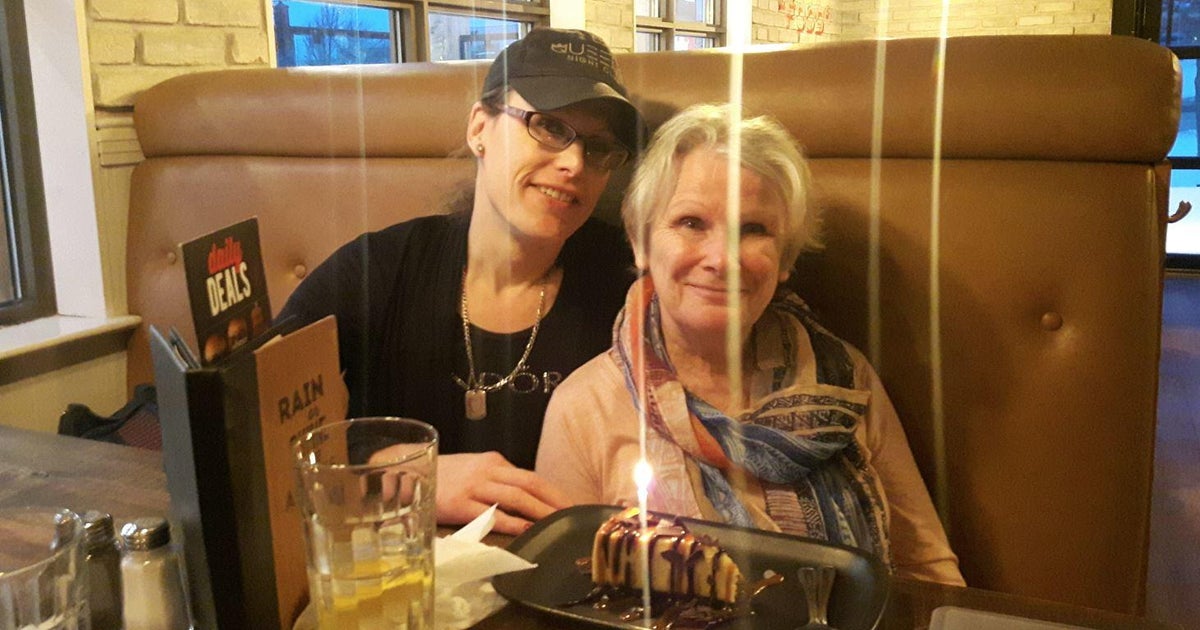Tony Dow on life beyond "Leave It to Beaver"
In the studio where he's spent the last 20 years sculpting meditations on our humanity, the artist is carving a gnarled piece of burl wood into a dramatic figure that'll then be cast in bronze, wrestling some sense of optimism from the struggle life so often presents.
Correspondent Jim Axelrod asked, "This face is in pain? And you're changing it to what?"
"To one of hope," the artist replied.
As many as 50 hours of work go into a piece before it's ready for his signature: "T. Dow." "Once you start a piece, that piece takes control," he laughed. "What it does is it tells you what you need to do next."
Finally, at the age of 76, the artist, Tony Dow, is happy to relinquish control of his work. It wasn't always like that: "From the time I was 11 or 12, I was being told what to do," he said. "I was told on the set. I was told at home. I didn't have control of my life."
"You were literally given your lines?" asked Axelrod.
"Yeah."
At the age of 12, Dow began starring as Wally Cleaver on "Leave It to Beaver," a TV series depicting a mythical version of mid-century American life – a show so popular, it's never left the screen since its debut in 1957.
"The genius of 'Leave It to Beaver' was that the show was written from a child's point of view," said Dow.
Born in Hollywood, Dow was a competitive swimmer as a kid when he tagged along with his coach to an audition. The coach didn't get the part. But as his mother told him at lunch, Dow got an offer: "I took a bite of my hamburger and I took a sip of my malt, and I said: 'OK.' And there went my life!" he laughed.
Beaver (Jerry Mathers): "What's this, Wally?"
Wally (Tony Dow): "Well, that's an official Scout's compass. I don't know exactly how it works, but when you start out somewhere, it's supposed to tell you which way you're going."
Overnight, Dow's life headed in a direction no compass could help him navigate. A teen heartthrob before he could drive, his adolescence unfolded in front of millions as he played the polite, trustworthy, "All-American" big brother.
Axelrod asked, "You didn't think Wally was gonna define you?"
"No, I didn't," Dow replied. "But it did. And I was gonna have to live with it for the rest of my life. I thought: This isn't fair. You know? I mean, I'd like to do some other stuff. I'd like to do some interesting stuff. You know, it's sad to be famous at 12 years old or something, and then you grow up and become a real person, and nothing's happening for you."
The sadness turned to anger, setting Dow up for a struggle that would mark the rest of his life.
"Anger, if it's untreated, anger turns to depression," he said. "But depression isn't something you can say 'Cheer up!' about. You know, it's a very powerful thing. And it's had a lot of effect on my life."
WEB EXTRA: Tony Dow talks about depression:
Axelrod asked Lauren Dow, Tony's wife of 41 years, "What's it like to listen to Tony talk about the depression?"
"Well, I'm very proud of him for talking about it, for dealing with it, and for sharing it with others," she replied.
Lauren helped Tony balance the curse of being linked forever to Wally, by helping him see clearly the blessings.
Axelrod asked, "What did you fall in love with?"
"His sweetness, softness, vulnerability," she said.
"I hate to do this. It's so trite and clichéd. But … "
"Spit it out!"
"Sounds like Wally! Is there any Wally in him?"
"I think there's a lot of Tony in the character," Lauren said. "They're intertwined. Wally was very much like Tony."
An artist herself, Lauren Dow makes mosaics in her own space in their shared studio.
"I think the art is, like, the best thing for him," she said. "And he's created some very interesting things while depressed."
Tony, too, credits his art - combined with medication and therapy - for getting a handle on his depression: "And I've got it under control pretty much. You know, I think people should take the leap of faith that they can feel better."
He still takes an occasional acting job, always aware that "Wally" is lurking nearby – but no longer troubled by it.
"I felt that way probably from the time I was 20, maybe until I was 40," he said. "And then at 40, I realized how great the show as, how appreciative I should be for being in that show."
Around his home in the hills above Los Angeles are plenty of signs of that appreciation: a pennant from the fictional Mayfield High that Wally attended; a bound collection of "Leave It to Beaver" scripts; even a box of cornflakes with Tony and Jerry Mathers, who played the Beaver, all grown up.
And in his driveway sits a sleek example of the benefits Wally Cleaver still provides Tony Dow: His first car, a 1961 Corvair he bought with "Leave It to Beaver" money, only to sell four years later.
Before the guy who bought it died a few years ago, he decided to leave it to Dow, returning the car – and with it, a reminder that perspective is the foundation of making peace with pain.
"You sure this was it?" Axelrod asked.
"I'm sure. Oh, yeah, it's got the same license plate. So anyway, pretty cool!"
"Yeah, I mean it is one of the rewards of being who you are. They knew where to find you!"
"Yeah, yeah," Dow laughed. "You're giving me all this positive stuff that I should be thinking about, instead of all the dumb stuff I think about!"
For more info:
- Follow Tony Dow on Instagram and Facebook
- tonydowsculpture.com
- Tony Dow Sculptures at Bilotta Gallery
- Depression Hotline (MentalHelp.net)
- National Hotline: Substance Abuse and Mental Health Service Administration
Story produced by Jay Kernis. Editor: Karen Brenner.







